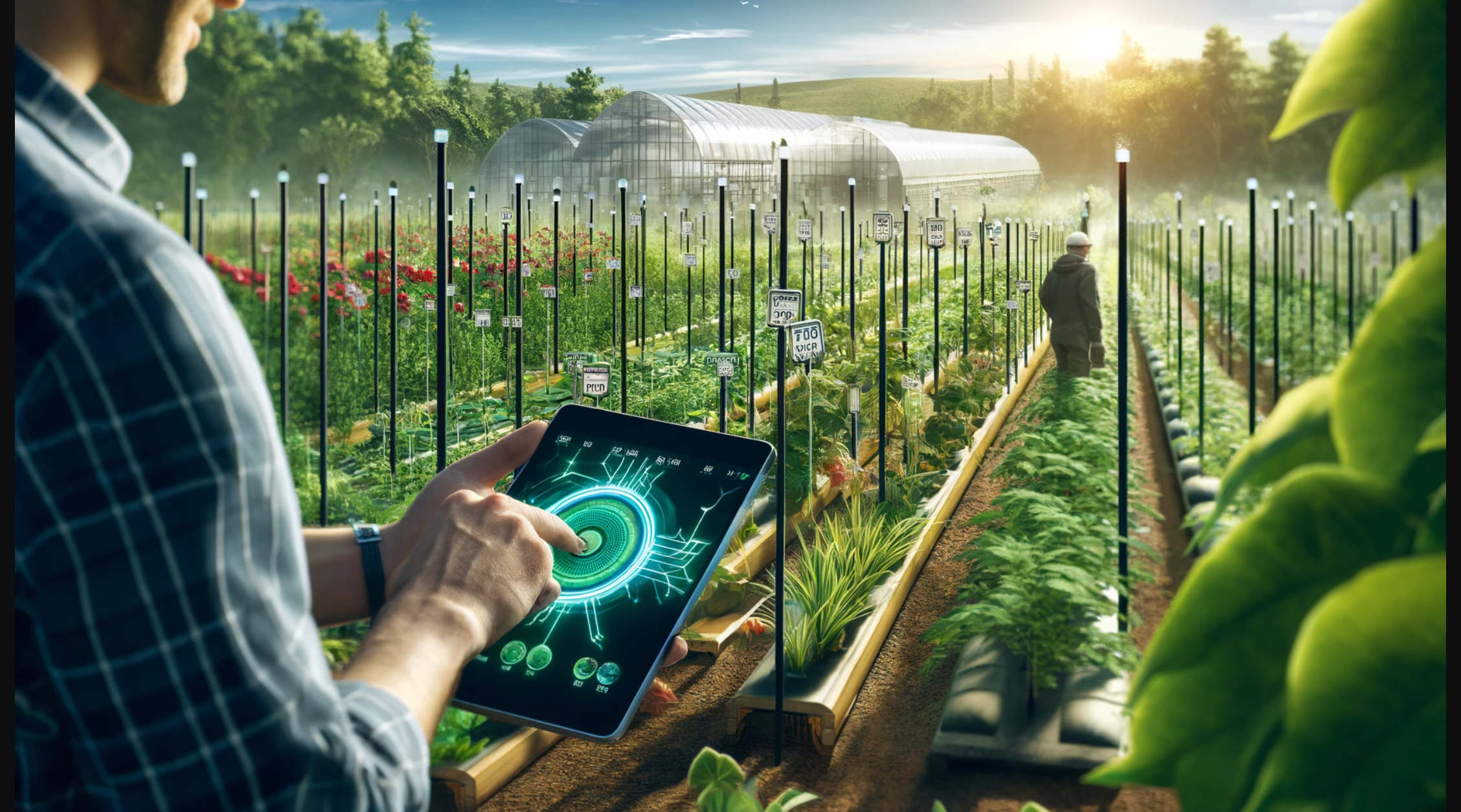5 Ways RFID is Revolutionizing Agriculture and Farming


The agriculture industry is undergoing a massive transformation driven by cutting-edge technologies changing how we farm. One standout innovation is Radio Frequency Identification (RFID). RFID is revolutionizing agriculture and farming by providing advanced solutions for tracking, managing, and improving farming operations. This technology not only enhances productivity but also ensures sustainable farming practices.
RFID technology revolutionises logistics and retail because it reduces manual labor, improves accuracy, and streamlines operations. It greatly aids retailers in stock tracking and theft reduction. RFID solutions could revolutionize farming and agriculture. Here are five major ways RFID is changing farming and farming in general.
The pros and cons of RFID will be discussed. RFID is useful for gathering information, managing inventory, monitoring crops, controlling access, and caring for animals. Each section provides detailed explanations and real-world examples to help farmers use RFID.
After reading the article, readers will understand why RFID has had such a big impact on farming and agriculture and how to use its features to improve efficiency and production.
Five Ways RFID is Revolutionizing Agriculture and Farming
1. Enhanced Livestock Management with RFID
RFID technology in livestock management is a game-changer. It involves placing RFID tags on animals, which allows farmers to monitor their health, track their movements, and ensure proper nutrition and care.
This real-time data helps detect early disease, reduce mortality rates, and improve overall animal welfare. For instance, a dairy farm in the USA implemented RFID tags to monitor the health and productivity of their cows, resulting in a 20% increase in milk production and better herd management.
The benefits of RFID in agriculture and farming extend beyond mere tracking. It enables farmers to maintain accurate records for each animal, facilitating better decision-making regarding breeding and health management. RFID is revolutionizing agriculture and farming by enhancing livestock management by making it more efficient and productive.
2. Optimized Crop Monitoring and Management
RFID technology is also transforming crop management. RFID sensors in fields collect real-time data on soil conditions, weather patterns, and crop growth stages. This data helps farmers make timely irrigation, fertilization, and pest control decisions, ultimately improving crop yield and quality.
For example, a vineyard in California uses RFID technology to monitor soil moisture levels and weather conditions. This information allows them to optimize irrigation schedules, ensuring the vines receive the right amount of water at the right time. As a result, they have seen a significant increase in grape yield and quality. RFID technology makes precision farming a reality, allowing for more precise and efficient crop management.
3. Improved Inventory and Equipment Tracking
Managing inventory and equipment is a significant challenge in farming operations. RFID solutions offer an effective way to track farming equipment and inventory. Farmers can monitor their location and usage in real-time by tagging equipment and supplies with RFID tags. This ensures all assets are used optimally, reducing downtime and enhancing overall productivity.
For instance, a large-scale agricultural operation in the Midwest implemented RFID tracking solutions to manage its fleet of tractors and other machinery. This system allowed them to track equipment usage, schedule maintenance, and prevent theft, leading to substantial cost savings and increased operational efficiency. RFID tracking solutions are revolutionizing agriculture and farming by providing farmers with the tools to manage their assets more effectively.
4. Streamlined Access Control in Farming Operations
Security is a critical concern for farmers, especially with valuable assets and livestock at stake. RFID technology provides robust access control solutions, ensuring that only authorized personnel can access specific areas of the farm. This reduces the risk of theft, vandalism, and unauthorized access, enhancing the overall security of the farm.
For example, a poultry farm in the South implemented an RFID-based access control system to secure their facilities. This system restricted access to critical areas, such as feed storage and animal enclosures, to authorized personnel only. As a result, they saw a significant reduction in theft and unauthorized access incidents. Access control with RFID technology is revolutionizing agriculture and farming by providing enhanced security and peace of mind.
5. Enhanced Data Collection and Analysis
Data is a valuable asset in modern farming. RFID technology facilitates enhanced data collection and analysis, providing farmers with the information they need to make data-driven decisions. RFID systems can collect data on various aspects of farming operations, such as crop health, livestock movements, and equipment usage. This data can be analyzed to identify trends, optimize processes, and improve efficiency.
For example, a large agricultural research facility in the USA uses RFID technology to collect data on crop growth and soil conditions. This data is analyzed to develop new farming techniques and improve crop yields. RFID tracking solutions USA are revolutionizing agriculture and farming by providing farmers with the tools they need to harness the power of data.

Conclusion
RFID is revolutionizing agriculture and farming technology with cutting-edge solutions that boost output. This technology can improve livestock management, crop monitoring, access control, data collection and analysis, and inventory and equipment tracking. RFID applications could improve resource management, yields, and farming efficiency.
They solve major agricultural issues. With advanced solutions, RFID technology can improve precision farming, sustainability, and farm management. RFID technology is essential for farmers and agribusinesses to adapt to changing conditions. This will enable real-time insights, simplified operations, and data-driven decisions that boost productivity and profits.
44degNorth specializes in providing cutting-edge RFID solutions tailored to the specific needs of the agriculture and farming industries. Our expertise ensures that RFID technology is seamlessly integrated into your operations, maximizing its benefits and transforming farming practices. By collaborating with us, you can benefit from our extensive knowledge and experience to achieve your agricultural objectives.
Don’t miss the opportunity to revolutionize your farming operations with RFID technology. Contact 44degNorth today to learn more about our solutions and how we can help you implement RFID in your agricultural endeavors.
Call Now: +1 (647) 937-9080
Reach Us At: innovation@44degnorth.tech
FAQs
How does RFID improve livestock management?
RFID improves livestock management by allowing farmers to track their animals’ health, movements, and breeding patterns. This ensures better animal welfare and efficient herd management.
What are the main benefits of using RFID in farming?
The main benefits of using RFID in farming include improved inventory management, enhanced crop monitoring, better livestock tracking, efficient resource allocation, and increased operational efficiency.
How does RFID technology enhance crop monitoring?
RFID technology enhances crop monitoring by providing real-time data on soil moisture, temperature, and other critical factors. This information helps farmers make informed decisions, improving crop yield and quality.
Are there any challenges in implementing RFID on farms?
Yes, implementing RFID on farms can be challenging, including the initial cost of installation, technical issues, and resistance to change. However, these can be addressed with proper planning, training, and support.
How does RFID ensure better access control on farms?
RFID ensures better farm access control by using RFID-based systems that restrict access to specific areas to authorized personnel only. This enhances security and prevents unauthorized access.
What is the future of RFID in agriculture?
The future of RFID in agriculture is promising, with ongoing advancements leading to more sophisticated and cost-effective solutions. As adoption increases, RFID technology is expected to drive further innovation and transformation in the agriculture industry.
